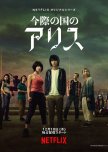
This review may contain spoilers
...as long as one is safe, it doesn't matter how many others die. Isn't that humanity?
My lord, what an utterly incredible experience this was. I've always thought that Sato Shinsuke was a director capable of making live-action adaptations that are not only watchable but actually entertaining (let's just ignore Bleach). His combination of dark humour, uncompromising ruthlessness, kinetic action sequences and high budgets allow his works to succeed where others have been derided. Alice in Borderland is probably his most popular work to date (breaking into the Western mainstream), and in my opinion, his best as well, in its blending of intense, hair-raising thrills with probing questions about morality and survival.Alice in Borderland is a series that examines how 'human' qualities- compassion, rationality, camaraderie- are stripped away by death's cold stare, leaving behind the singular impulse to fend for yourself and throw your brethren under the bus without a second thought. In the process, the capacity for high reasoning is often left behind, and the tragedy of many of the games is that participants will impulsively launch themselves to their deaths without realising that the solution could have been easily discovered with just a bit of thought and teamwork. In the second half of the series, The Beach sets up an interesting Lord-of-the-Flies-esque scenario that demonstrates the impossibility of establishing order amongst humans in the absence of societal restraints, resulting in (especially amongst the executives and militants) the emergence of violent and hedonistic impulses that only have a chance to creep forth in parallel Tokyo. As suggested by some of the characters' names (rabbit, cheshire) and the recurring zoomorphic elements in the games (tigers, jaguars, horse-headed killers), Alice in Borderland reminds us that we were born as animals, and, if we were to be placed in a world where we are both hunted and allowed to roam free- we will become animals once more. And those who value their humanity? Though anyone can die, they stand the highest chance of survival.
But depth of themes alone don't make a series memorable- there has to be fun and games! And how darkly hilarious these games are, blending an off-kilter playfulness with horrific violence and ironic twists that are often so obvious that participants will trip over them and fall to their deaths. Eschewing the grandiose, sweeping setpieces so often seen in Western dystopian works like The Hunger Games and Maze Runner, Sato opts for ordinary apartment complexes and subway tunnels, plainly decorated and illuminated with sterile white light that contrasts with the red of spilt blood. Marrying the fast-paced hand-to-hand combat of 'Kingdom' with the wanton firearms slaughter of 'I am a Hero' and 'Inuyashiki', the series DELIVERS on the action sequences (my favourite would have to be a certain strobe-lit fight scene in the penultimate episode), though these are sadly somewhat absent from the middle of the series, which suffers slightly by trading off thrills for a slightly fanservicey mystery element. And as shown in the infamous third episode, this is is a series which isn't afraid to pull its punches, driving home the hard premise that anyone can die-and that ultimately, survival is as much a product of pure luck as it is of intellect and stamina.
With the backing of Netflix and his usual high-level polish, Sato's budget and camerawork far exceed the tacky, cheaply-filmed quality of most Jdramas. As usual, he brings in a cast of A-listers, all of whom perform at least admirably. Yamaken was dashing as usual, but the standouts were Tsuchiya Tao and Asahina Aya, who demonstrate a capacity to be excellent action heroines, and Murakami Nijiro, who delivers an enigmatic, smirking performance as the Cheshire Cat of this violent, bizarre Wonderland. Overall, Alice in Borderland is a must-see, and I just hope that the second season keeps the same level of quality.
Was this review helpful to you?

TTB:
Varied cast of characters defined (and unwrought) by their human imperfections, buoyed by a range of fantastic, occasionally despicable performances. You and I, and how we'd react to a sudden zombie apocalypse. Also, great character development for the main 'hero'.
Sense of high production value due to a cleverly used physical setting (train interior) and fantastic attention to detail with the zombies themselves. Behind the clips footage shows the efforts that the team undertook to paint up each individual zombie to seem rabid, horrible and ironically life-like.
Aside from their appearance, the zombies were excellent not only because of the frightening manner in which they twitched, scuttled and savaged their human brethren but because we saw that they too were normal, unsuspecting humans. There was great pathos in seeing members of the cast turn into these beasts, even moreso when the living had to fight against their own friends.
Novel concept (the train) that created a constant feeling of entrapment and claustrophobia, the notion that although one is on the move the threat is always breathing down their necks or clawing on the next set of doors.
Simple yet well-executed social allegory about class division, the pitfalls of Capitalist greed and the dangers of individual self-preservation towards the collective fight for survival.
Peninsula:
A varied cast of characters let down by being either too bland (the hero) or absurd to fully empathise with. The 'villains' in TTB are the sneering upper-class bigots that you might see in real life. The 'villains' in Peninsula, while not out of place in a post-apocalyptic film, were too cartoonish to see as realistic or despicable. And while Train To Busan kept me guessing until the end, Peninsula made it easy to see who death was hovering over.
A larger budget that was squandered on an over-reliance on CGI. While certain scenes of the destroyed Korea carried weight, the backgrounds and especially the car chases often felt nauseatingly cheap-looking.
'Weight' is a theme that can be considered more broadly when comparing the two films- both emotional and physical. In TTB, the human struggle was emphasised by the improvised weapons- baseball bats, sports gear and the fists of the survivors. These 'weapons' carried weight with them.The close-quarters combat was brutal and ugly, we were seeing ordinary people having to struggle and fight for their lives. By contrast in Peninsula, guns were used abundantly, mowing down hordes of zombies in great swathes- diminishing both the threat of the zombies and the desperation of the humans (though this was still present).
The zombies themselves lacked weight. From friends and family turned into cannibalistic beasts, they became rag-dolls that would be sent flying with a well-timed car impact, video game entities that could be thwarted and exploited en masse with a few (admittedly clever) tricks. It didn't help that they too were CGI much of the time.
Awful, and awfully abundant English dialogue that was sometimes as coherent as the zombie screeching.
Derives too heavily from pre-existing media like the Mad Max franchise.
Melodramatic like TTB yet lacking the first movie's well-deserved emotional punch. A lot of sentimental music and slow-motion crying scenes. All the meaning in Peninsula essentially boils down to basic moral waffle like 'Make sacrifice good', 'Family important' and 'Repent for mistakes good'.
...
Was Peninsula a terrible movie? No, in fact it was mildly entertaining overall and while I wanted to do something else, I managed to sit through it without skipping parts. It's a decent enough watch but lacks substance.
Was this review helpful to you?

Was this review helpful to you?

3 Nen A Gumi: Ima kara Mina-san wa, Hitojichi Desu
15 people found this review helpful
This review may contain spoilers
If you want to change, now is the time!
Pros-At its bare minimum, 3-nen is a timely critique of cyber bullying, herd mentality and the damaging nature of false accusations, applicable to not only Japan but to those who inhabit online spaces or social institutions- so, everyone in other words. It demonstrates how on the internet, malicious, often fabricated rumours can spread like wildfire to life-destroying effect, and how the collective can mercilessly oppress the individual until they simply break. It is an important reminder that human-induced tragedies like suicide aren't the responsibility of one person but many; and that remaining complacent towards bullying is tantamount to condoning it. So really, the series itself can be described as a long and important lesson that directly implicates the viewer in its didactic purpose.
-Unlike its awful, conspiracy-based successor 'Nippon Noir', 3-nen succeeds, for the most part, in its twists and turns, creating an urgent, exciting plot that keeps you guessing. From the beginning, the stakes are set high and the moment that Hiraagi announces the doors are locked, you know that this series really isn't fooling around.
-Credit where its due, I like Shogo Muto's decision to make Hiraagi a former Tokusatsu suit actor/ stuntman. Not only did the screenwriter pay homage to prior series Kamen Rider Build (albeit in a rather self-important way), it gave reasonable explanations as to why Hiraagi is a skilled fighter, can handle explosives and is inspired to impart values of justice, empathy and personal change onto his students.
-Casting was a mixed bag, but there were standouts. Suda Masaki delivers, as usual, a compelling performance as the enigmatic Hiraagi. Suda bounces from from playful enthusiasm to merciless rage, and then to heartfelt sincerity with the flexibility of a rubber ball, though bordering on overacting as per usual. Nagano Mei's characterization of the class captain was realistic, especially in her emotions of fear and regret. Tomita Miu was a welcome presence in retrospect, but I do find problems with her inclusion (see cons). And who can hate Mori Nana?
-Liked the opening. The morning dance routine was pretty sweet too.
Cons
Having only watched 3-Nen, NN and KR Build I'm no connoisseur of Shogo Muto's work. But having watched these three and read about his other series, I must say that his writing isn't terribly cerebral, is it?
- For one, hackneyed cliches and plot devices rear their ugly heads. Terminal illness, well-timed fainting, bad boys with soft sides, bedridden mothers, unsympathetic and incompetent cops, misunderstood yet well-intentioned protagonists, unrequited crushes, fat people as comic relief, clinging to the hand of someone falling off a tall building... I could probably think of more on a rewatch. One or two aren't bad per say, the problem is when they start to accumulate.
-And while I mentioned that the series has timely social commentary, I hate how preachy and self-important it is. Hiraagi's long rants, brimming with metaphors about daggers in hearts and intercut with scenes of the students silently crying are insufferably sanctimonious. This forced, contrived melodrama defeats the moments of off-kilter humor and dark comedy that added some levity to the series. And subtlety? Hiraagi must have bagged it at the start or blown it up in the first explosion. Crying, screaming, desk-slamming and oh, I almost forgot that uh- cyberbullying is bad, empathy is good and that we are all pieces of trash. Perhaps Hiiragi didn't say it enough times. To my belief, effective social commentary is woven into a work, not necessarily with complete subtlety but with at least some degree of complexity. 3-nen throws it like an angry, self-righteous punch to the face.
-Some of the acting was awful, particularly from the students. One who comes to mind is the idol fellow who was playing the belligerent dancer who picks a fight with Hiraagi, but this may be because he had an annoyingly large amount of screentime.
-Belief has been suspended. Too many times. Normally this wouldn't be an issue but since this work is intentionally set in the present day and in the real world, its unfeasibility becomes somewhat of a problem. The series falls to bits under the slightest bit of scrutiny, and I don't feel the need to explain its questionable aspects because there are too many.
-I believe this is the third time that I've written this but I really do want to point out this show's hypocrisy. It rambles on about bullying but perpetuates it by making a mockery out of the token 'fat' character. Not cool.
I hate using the word 'overrated' but I hate hiding my convictions even more. 3-nen a gumi, while relevant and entertaining, is overrated. 6.5/10
Was this review helpful to you?
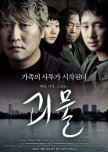
A monster movie that devours its competition
The titular monster of 'The Host' starts off as a fish before mutating into an oversized amalgam of animalistic traits. Claws that have smaller claws attached, a serpentine body, a multilayered maw full of teeth and a prehensile tail. When it first attacks, it lumbers head-on like an enraged bull, but it is also capable of deception, striking from the shadows and swinging from overhead beams like a demented acrobat. Despite how its CGI is dated, the monster is not only grotesque and frightening but captivating and amusing. Much of this can also be said of 'The Host' as a movie. By definition it is a horror movie but under Bong Joon-ho's direction it morphs into dark comedy, family drama, tragedy and most notably, a barbed political allegory. Unlike the CGI, this allegory remains frighteningly relevant, even to- no, especially in this day and age.Director Bong's satirical attack is two-pronged. The film is known widely to be a critique of America's continuous presence in South Korea. The opening scene of an American doctor forcing his South Korean colleague to pour formaldehyde in the Han river was closely inspired by an uproar-causing real-life incident, and this notion of insidious poisoning leaves little to the imagination. As does the toxic chemical agent 'Agent Yellow', which evokes a fairly recent example of American Imperialism in Asia that ultimately caused more harm than good.
What is scarily applicable to the entire world, however, is the film's depiction in portraying government incompetence; both at preventing disasters and handling them. An unfortunate number of viewers have derided this film for showing its monster 'too soon', but this seems to be the point. The government knows that chemicals are mutating the fish in the Han river, they know of rumours that their irresponsibility in letting the Americans take charge is creating a literal monster- but they do absolutely nothing. The people, without the government's warning, behave likewise- they see the beast hanging like a fruitbat from a bridge, they throw snacks at it, and they only take action when it starts devouring them. Too little, too late. Rather than making amends and assisting the victims of the disaster, the government focuses on preventing their own fall by spinning a web of lies and red tape, and using the 'infected' as quasi-scapegoats on which to deflect public blame. This tragic process has been seen time and time again in human history- most recently, with a certain pandemic that starts with 'c' and rhymes with 'coronavirus'. It is Bong's ability to spin such a relevant allegory while creating a scary and fun movie that makes him such a fantastic director- hence why this film is just so brilliant.
Brilliant, but not perfect necessarily; the film's middle act drags slightly without a monster to chase it, though its more human emphasis helps build the political allegory.
The main characters in this film were highly likeable, both in their humorous family dynamics and their steely determination to take things into their own hands. They were buoyed by the film's venerable cast. Song Kang-ho was particularly memorable as the narcoleptic Gang-du, whose dimwittedness was matched only by his unyielding devotion to his daughter and his blubbering, sincere desire for his despair to fall on sympathetic ears. Ko Asung, then a child actor, delivered an endearing performance that packed both heart-stopping fear and resourceful bravery.
The monster scenes, especially the wild chase at the start, are some of the best that I've seen and were often unexpectedly hilarious. I also enjoyed seeing how the Park family took on the monster with largely scavenged weapons; signs, old Winchesters, bows and molotov cocktails.
The theme song of 'The Host' perfectly captures the film's prevailing mood; not terror, but amusement with a melancholy tint to it.
https://www.youtube.com/watch?v=6icONTC43dI
9.5/10
Was this review helpful to you?

"Let's live together, the four of us."
If there is both hope and sadness to be found in the human condition, it is to be found in films like ‘Our Little Sister’. Nurtured by Koreeda’s empathetic and sensitive direction, it flourishes into showers of pink cherry blossoms and joyous smiles, evoking such rapturous beauty that you want to stay in the moment for just a little longer. But time moves on- the seasons change, the cherry blossoms fall to the ground and people say their farewells to each other. Through its harmonious balancing of dual aspects: optimism and melancholy, caring and abandonment, life and death, this bittersweet drama embodies the concept of ‘Mono no Aware’ (物の哀れ). There is vibrance and beauty in the existence of life, but it is also fragile, transient- under the watchful gaze of an old mansion and a giant tree, it blooms and fades away in the tiniest span of time. But ‘Our Little Sister’ emphasises- quietly but emphatically- that this is all the more reason to savor it in every moment, be it eating meals with your loved ones, feeling the sun streaming down on your face as you ride through a tunnel of falling petals or looking out at the grey waves after a funeral has passed.Moving away from this concept of ‘Mono no Aware’, Koreeda centres his drama on a fractured family unit and depicts how it heals-slowly- as the missing piece is filled by another. As he always does, he “turns the camera into a window” (to quote Brian Tallerico), capturing both the ups and downs, and the larger joys and tragedies with a masterful lucidity. I’ve already waxed lyrically on Koreeda’s other films so there isn’t much left for me to say as it ticks all of his boxes- damaged families, slow pacing, food scenes, passing trains, etcetera. One interesting thing that I would like to point out is how the composition of the (matriarchal) household has changed in the absence of the father and mother. Sure there are three sisters, but Sachi is ostensibly the mother-stern yet kind- while Yoshino and Chika are like unruly children. When Suzu enters the household, the two middle sisters move up the totem pole, resulting in the youngest sister being doted on as both a child and a little sister. And only when their real mother enters the picture are we reminded that Sachi is, herself, a daughter- even if her childhood was unwrought by the folly of adults. In depicting the shifting of familial roles, as he did in ‘Nobody Knows’, Koreeda provides a testament to the strength and adaptability of children (through three of them have grown up). Trauma may have shattered their lives, but through their shared companionship, they slipped back into the flow of life. Time spent together hardened and solidified the bonds between them, and having confronted and moved on from the past, their scars began to fade away.
The main deviating factor of ‘Our Little Sister’ from Koreeda's filmography is its soundtrack. Foregoing Gontiti's melancholy guitars or Bach's variations, Koreeda instead chooses a lush and sweeping orchestral score by the talented Kanno Yoko- a perfect complement to the scenic coastside setting of Kamakura. It seems not everyone liked this soundtrack, with some reviewers complaining that it is excessively sentimental, syrupy, sickly-sweet, something else with sibilance. However, I think that there is nothing wrong with it due to how this film is (intentionally) more of an audiovisual feast than Koreeda’s others. Similarly, the soundtrack could be accused of broadcasting the intended emotions too ‘obviously’, betraying Koreeda’s tendency towards the implicit and objective. But since the film doesn’t veer into being excessively sentimental or melodramatic, I don’t see a problem with this. In short, the soundtrack is excellent, and it is streaming on spotify and apple music for your listening pleasure.
A large part of this film’s popularity is presumably due to its ensemble cast, all of whom performed excellently. Ayase Haruka and Nagasawa Masami, both mainstream stars, conjured forth their inner talent to give naturalistic, high-caliber acting. Kaho, in a far cry from her darker roles, was great as the goofy Chika- though I still found it hard to erase the memory of her as the blood-soaked vampire warrior K from 'Tokyo Vampire Hotel'. Suzu, then a newcomer, clearly had some measure of uncertainty- but this was perfect for her character, whose wide eyes radiated sincerity and later, well-earned happiness. Other names with considerable mainstream fame- regulars Kirin Kiki, Lily Franky, Kase Ryo, then Suzuki Ryohei, Sakaguchi Kentaro (in a subtle ‘Ore Monogatari’ reunion), Tsutsumi Shin'ichi, Fubuki Jun, Otake Shinobu (the mothers from ‘Soredemo Ikite Yuku’) and so on- also contributed to the vast stirring pot of talent. Another special mention to Oshiro Maeda, then a young lad, who I hope to see in more of Koreeda’s future works.
Compared to his other work, ‘Our Little Sister’ isn’t regarded as strongly by critics. It was apparently disparaged at Cannes and critics have looked down their noses at it, labelling it as “decidedly middle-brow”, “Kore-eda lite”, “frictionless” and worst of all, “boring”. To which I say that they’re just snobbish, pretentious and a bit too jaded. This film isn’t meant to be dark, conflicted, fraught with emotion. It is meant to be a feast for the senses and for the heart- and to that end it succeeds, leaving viewers emotionally satisfied and with just a tinge of wistful sadness. 8.5/10
Was this review helpful to you?

This review may contain spoilers
“You never really understand a person until you climb in his skin and walk around in it.” A.F
**Minor Spoilers**'Switched' takes the oft-used concept of the body swap and gives it a cruel twist: the 'beautiful' girl gets the short end of the stick despite having done nothing wrong, while the 'ugly' girl that appears to win it all is callous and selfish. What follows is a simple but well-made parable on how envy causes more harm than good, how real beauty isn't only skin deep- and how it takes just one kind friend to pull you out of despair. But the linchpin of the series, in my opinion, is the way it shows that true ugliness is created from the internalisation of cruelty and mockery. And this true ugliness? All-consuming hatred, a self-propagating force that eats away at everything (yourself included) and pushes others even further away from you. This naturally causes you to hate yourself even more and closes the doorway of hope- until shrouded in the darkness of your mind and standing under the crimson moon, you stare in anticipation at the streets far below. Yikes. Though I included Atticus's quote because of its relevance towards empathy, it only applies to Ayumi, truth be told. Zenko, on the other hand- she may walk around in Ayumi's skin, but as her mother points out, she is still the same hateful, spite-filled girl within.
Notes:
-Six episodes was just the right length.
-One might say that the symbolisms used, e.g. birds representing freedom, each girl seeing their true self in mirrors, were too on the nose. However, I don't see this as a problem because this series is intended to be accessible and easy to understand rather than esoteric. The fact that the series even has symbolism which it uses to further its didactic purpose is rarely even seen amongst J-dramas, to be honest.
-The production value was clearly a cut above the average J-drama, in no small part to the Netflix funding. It was thoroughly refreshing, a blast of fresh air even, to watch a Japanese drama that didn't look as if it was filmed and produced by an amateur crew with a bad camera.
-Acting was very strong from rookies Kiyohara Kaya and Tomita Miu, (who gets a role that doesn't boil down to 'ha-ha fat person funny'). They succeeded greatly in not only playing duel roles but characterising each role with pinpoint accuracy- pulling off Ayumi's sweetness and Zenko's homicidal finger-biting equally well. Kamiyama Tomohiro and Shigeoka Daiki also did quite well, although I do question the typical high-school series/movie trait of having two men in their mid-twenties play students almost ten years younger. I admit that Shigeoka, as the endearing Kaga, triumphed thoroughly in channeling his grinning schoolboy.
-Soundtrack was good but a bit kitschy and sparkly.
-If I had a complaint besides all the slow-mo's and awful 'splat' noises for when the bodies hit the floor, it would be the excess of love-triangle shenanigans when the series could be delving further into its social issues. It would be a truly excellent series if not for these flaws, but I do understand the need to add sugar to make a dark series palatable for its young audience.
As it stands, it is one of the finer J-dramas and dare I say, a much better examination of bullying than the hypocritical 3-nen A gumi (where, might I add, Tomita was used solely for the purpose of comic relief based on her weight).
9/10
Was this review helpful to you?

Episode 1 was written by Higa Sakura and directed by Kore-eda Hirokazu. It depicts the actress coming back to her hometown to spend time with her mother for a day.
The crux of the episode is Arikasu's newfound sense of alienation towards her mother, who has changed subtly yet worryingly. This is exacerbated by the arrival of a male stranger that Arimura senior is alarmingly close to, who sits uncomfortably between being a convenient handyman and a surrogate son. However, it is clear that even with this stranger in the picture, the mother-daughter bond hasn't been broken and there is still warmth and love between them.
This episode is essentially a mini Kore-eda family drama that just happens to have Arikasu as its main character- rather than a pure actorfic solely designed to please fans of its baby-faced, softly spoken star. I like how the use of the various Arimura-themed paraphernalia and scattered references to her work aren't gratuitous, instead being used to highlight her mother's pride and her inability to separate her career from her private life. This, along with Kore-eda's deft handling of minute human interactions and a naturalistic turn from the usually inconsistent star go along way in humanising the now-ubiquitous Arimura, whose face looms down from screens and advertisements across the nation.
Kore-eda's signature elements make themselves present- food preparation and meals as symbols of familial connection, idle conversations while walking down the street, flaky mothers, meaningful close-ups on seemingly insignificant details, the passing of a train in the distance. Without spoiling too much, this episode could be described as a partial amalgamation of Still Walking, Going my Home and Our Little Sister- those who've seen these works will understand what I mean after they've watched this episode. While it isn't as complex or well-developed as Kore-eda's best works (the brevity of the story is mostly to blame), it has still been simmered carefully to produce subtly deep and bittersweet flavors.
Episode 2 was excellent; a scathing social commentary about the way women are perceived in a sexist society. Viewers of the series who are just watching for Arimura to act 'kawaii' should take a step back or be slapped in the face by the episode's lampooning of that very word. After all, Japanese society dictates that ambitious women are 'self-important' and women SHOULD be demure, submissive and yes, 'kawaii'- what better way to attack this toxic social attitude than to use an actress whose public persona and roles thoroughly exemplify this k-word?
Arimura acts as an observer here; initially viewing a previous romance drama of hers, and then bearing witness to a relatively one-sided conversation between her friend and a male coworker, who is clearly just using the former as leverage to see how 'kawaii' Arimura is in person. She is also observed herself- much of the dinner scene is seen from the co-worker's perspective, as he ogles her and clearly views her as little more than an object of desire.
Arimura's discomfort at the conversation, during which the coworker complains about female superiors while making leering comments towards her crescendos into a beer-fueled rant against not only the way she is treated but the entire status quo of male-female relations in Japan; how women are expected to lower themselves emotionally and intellectually in order to gratify the needs and wants of men. An unexpectedly difficult episode to watch, but all the more fantastic and socially relevant because of it. That being said, there is no way that this would be shown on national TV because people would be scared and put off by how it challenges the status quo. OMG Kasumi-chan speaking out against sexism? I'm literally shaking an crying rn. Totally not 'Kawaii' at all!1!!
I honestly think that Arimura's acting has improved- her performance in Flying Colors was good, and now this too impressed me. Towards the end of the episode, she gets the chance to have an almost Sakamoto Yuji-esque speech, where her acting ability can be shown off. She doesn't raise her voice too loudly but the sense of anger and spite is clearly apparent; she was almost channeling Fumi Nikaido in this regard.
Episode 4 plays out like one of the dream device sequences from the children's anime, Doraemon. Initially starting off with a dream fantasy of Arimura's in which she dates Kevin Takeda, a half-American dreamboat who hails from Boston, it takes a darker turn into the relentless nature of paparazzi in Japan and the constant sensation of being watched, spied on. This episode conveys the double-edged nature of fame; how it comes with constant public scrutiny and the intrusion of the nation's ever-hungry desire for gossip into one's personal life.
Episode 5 is surreal and almost arthouse-like. To sum it up, Arimura can't open a jar of jam and spends the entire day in a bizarre, disconnected state in which she uses roundabout methods to get others to do it for her. The most prominent of these sequences involves two schoolchildren who bash each other with their karate kits and have back-and-forths about whether the other is a liar or not. One of them wonders whether Arimura is in fact Banksy, the elusive English graffiti artist. The most I could say about this episode is that it conveys the relatable sense of getting caught up in, and wasting time on something menial that should take just a second to achieve; and the subsequent relief of freeing oneself from this odd burden. There's probably some deeper philosophical meaning to it all and I'd be happy if someone could offer their thoughts on it. The episode does have a nice artistic symmetry, its conflict beginning and ending with the strike of a drumbeat. This is also the first episode to feature a Western guest role, in the form of a mathematician (huh?) by the name of Peter Frankl playing a confused convenience store manager.
Was this review helpful to you?
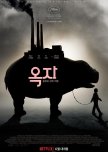
"I'm an animal lover!"
Bong Joon-ho's 'Okja' depicts a conflict between a corrupt corporation and a radical animal rights organisation over a giant porcine beast, with an innocent girl being caught in the crossfire. This charming yet brutal satire reveals the hypocrisy of the phrase "animal lover", a phrase that the corrupt fat-cats of the Mirando corporation and the not-terrorists of the Animal Liberation Front would both use to describe themselves. Director Bong's triumph is ripping away the idealistic facades of both sides- revealing the slaughterhouses behind the smiles and saccharine PR of greedy corporations, but also the cruel sacrifices made by animal rights groups for the sake of a 'greater good'. Yet given how we see Mija catching and eating fish, it is made clear that this film's meaning can't be cut down to 'meat is murder'- rather, 'Okja' is a condemnation of how the lives of animals- sensitive beings that can feel fear and pain- can be callously invalidated for the sake of human agendas. We can eat meat if we choose- but can we really love animals when we put their necks on the chopping block and our money in the pockets of their murderers? Can we really justify the consumption of those cute critters with bullshit slogans like 'eco-friendly' and 'GMO-free'?Director Bong demonstrates his capacity for drastic tonal shifts once more to magnetise viewers; they laugh at the farcical chase scenes and smile at the friendship between Mija and Okja, and then are walloped in the guts as they hear the screams of anguished pigs in abattoirs and testing rooms. Similarly, his decision to shoot in both rural Korea and bustling New York contrasts the large-scale ambitions of Mirando co. and the ALF with Mija's simple desire to have her only friend back, adding moderation and a human touch to what could have been an impersonal clash of black-and-grey forces. Generally, the ensemble international cast performed well; Tilda Swinton was particularly impressive in her duel role as the Mirando sisters. Her ability to contrast Lucy's narcissism and false cheer against Nancy's cold pragmatism and barking assertiveness demonstrated the duality of greedy and opportunistic corporations; their flowery public front and their aggressive, business-like drive. Without Nancy's sunglasses and hairstyle, I would've been hard-pressed to notice the sisters' singular actress and I hear that Swinton was also amazing in Snowpiercer, which is next on my list. Seo-Hyeon Ahn, despite her young age, was more than a match for the Western performers, capturing Mija's fighting spirit and love for Okja with sincerity and poignance. And I was surprised to know that before her excellent turn as the crazy maid in 'Parasite', Jeong-eun Lee was Okja's voice actress- just how could a human convey such animalistic grunts, roars and squeals?
Unfortunately and in more than one way, 'Okja' is far more feast than famine. On several occasions, Director Bong overshoots with the satire; his flamboyant bigwigs are often transparent and hard to take seriously with their childish histrionics, not helped in the slightest by the overacting that breaks out on several occasions. In my opinion, the film's didacticism is far too thinly veiled; replace the superpigs with regular livestock and many scenes become identical to the 'do you know where you food comes from!?!?!?!?' videos that are shoved in your face by Peta or advertised on your local traffic light. But in part, these flaws are redeemed by a powerful ending that packs both hope and tragic realism.
As I wrote this review, I was tucking into a nice big plate of marinated ribs. Though I don't think that I will stop eating meat, I will certainly know to not inject any sense of 'rightness' into the deed.
P.S. I don't get how this film is championed by vegans for gods sake you literally see Mija and Gramps catching fish and making fish stew.
Was this review helpful to you?
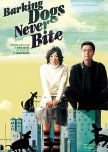
This review may contain spoilers
"Conscience is the dog that can't bite, but never stops barking." -Unknown
I absolutely loved Parasite so the next step for me was to go to the start of Bong Joon-ho's filmography. While I can't say that 'Flandersui Gae' is as clear and polished of a gem as Parasite, it definitely feels like a spiritual precursor- not least because of the dark humor, tonal shifts and class/poverty centred themes. Seeing the basement dwelling hobo, privileged little dogs and fumigation, I wondered whether director Bong was conscientiously building on this film as he shot his Palme D'or/ Academy Award winning flick almost twenty years later.For a film that depicts taboo practices, 'Flandersui Gae' is surprisingly charming and droll, and while it takes pleasure in dispensing of its small and fluffy friends it makes sure to make you feel guilty for feeling the same way afterwards. The notion that actions have consequences, while not a central idea, is something that is dwelled upon.
While focusing on an unemployed lecturer and a bored book-keeper, it expands to capture the lives of those living in the central apartment complex. With the exception of the hobo, none of them are desperately poor. They can afford to buy groceries, to get drunk out of their minds, to keep pets despite the apartment's rules. But they are effectively prisoners of their mediocre social situations, sentenced indefinitely to a boring future. They seem to represent a demographic of Korean society that has hit a dead end in life- a dead end that can only be broken through via a pipe dream or moral transgression. Their aimlessness, opportunism and crushed hope are depicted empathetically by director Bong. After all, he had once stood in their shoes, having lived in that same apartment complex prior to directing. Considering this, I personally think that Yun-Ju is driven to murderous intent because the incessant barking reminds him of his mediocre standing in life. Its as if the pampered dogs are taunting the laid-off academic who, even within his prison of an apartment, is emasculated and controlled by his demanding wife. While he and Hyun-nam have dreams of their own, these aspirations are silenced by their social situations. Only at the film's end, when he resorts to bribery and she is fired from her job, do they catch a break from their servitude.
'Flandersui Gae' is one of those films that is more on the implicit side, a given due to a number of dialogue-absent scenes and some slightly overlong tangents. Nonetheless, it is intriguing and thought-provoking, and I think that it will get even better on a second watch. The performances are naturalistic and the jazzy soundtrack is low-key but pleasant. If you liked Parasite I would strongly advise you to check this out.
Fun fact, the Korean title denotes this film in part as a satirical reaction to the English children's tragedy 'A dog of Flanders'. For some perverse reason, this story is intensely popular in Korea and Japan (especially amongst kids), where it has spawned numerous adaptations. While this story affirms that dogs are indeed man's best friend, director Bong evidently thinks otherwise.
Was this review helpful to you?

Jojo's Bizarre Adventure: Diamond Is Unbreakable
6 people found this review helpful
"What did you say about my hair?"
In terms of live actions, you could do worse than Miike Takashi's 2017 remake of this popular manga/anime season. The special effects are quite decent, the costumes don't look too low-budget, the storyline is, for the most part, faithful to its source material, and it may be worth watching just for the ensemble cast alone. But despite some interesting alterations by Miike- the decision to film in an old Spanish town, of all places, and the portrayal of Stands as cybernetic ghosts- this film is just dull. Unless a director is shooting for a 'so bad it's good' type of comedy, it seems difficult to make a genuinely good live-action out of a source material that isn't grounded in reality- JJBA being a key example. Miike didn't capture the playful and dare I say 'bizarre' nature of the source material, opting instead for a hardboiled action movie with fantasy elements. As a result, the costumes and dialogues are, for want of a better word, cringe despite the best efforts of the notable cast. Theres simply no way that the lanky Yamazaki could have portrayed an ultra-buff 16 year old half-Japanese teen, and despite his short stature the 20-something Kamiki was about 20 centimetres too tall and 8 years too old to play Koichi. The film also drags and stagnates during key moments, which just seems counterintuitive to the energetic, fast-paced source material. With the film's lack of financial success, there won't be a second part. Which is a shame because I would've liked to see Yoshikage Kira and Shigechi in LA form.Was this review helpful to you?

Was this review helpful to you?

"This is my happiness."
Pros-As one might expect, 'Hitori Camp' is an upbeat and stress-free series that is relaxing to watch. The anguish that one might obtain from watching J-dramas is nowhere to be found.
-This series could easily be labelled as an unconventional comedy; every episode is a wellspring of amusement. Unlike most J-dramas, which rely on slapstick or wordplay, the humour in 'Hitori Camp' comes from odd camera angles, wacky scenarios that are presented understatedly, and just a bit of schadenfreude. The scenes where Nanako talks to herself or role-plays in pursuit of her ingredients are particularly hilarious. She's a bit like Sid from 'Toy Story' but not sadistic and bratty.
-The guest roles are all memorable, with each of the minor characters leaving their mark by imparting lessons onto the two protagonists. Towards the end of the series, they also get more screen-time and some of their personal stories are quite touching, especially in the penultimate episode.
-Kento and Nanako are contrasting but interesting and likeable protagonists that you learn more about as the series progresses. Miura Takahiro and Kaho deliver natural performances, realising Kento's haplessness and Nanako's eccentricities. Filming this series must have been a change of pace for them.
-It is satisfying to see the protagonists' adventures culminate in a self-prepared dish. I don't know whether it is Miura and Kahos' acting or their genuine enjoyment, but you can really feel their enthusiasm as their scarf their efforts down, mostly with a bit of alcohol. Whether the food came from a river or out of a can, it is clearly a source of pride to them.
-Lovely and homely shooting locations. Whether the site is by the sea, amongst the trees or even in the comfort of one's home, 'Hitori Camp' makes it clear that you don't have to be in the midst of the wilderness to experience the pleasures of camping.
-Nicely minimalistic soundtrack, interspersed with some classic Japanese songs that the protagonists absent-mindedly sing as they go about their activities. The theme song, 'To the moon' by Yogee New Waves is worth another listen. https://www.youtube.com/watch?v=UPs6EjmDE38
-While not the focus, the series does take some time to comment on the nature of loneliness and what effects it can have.
Cons
-Kento and Nanako never appear in the same episode. Hoping for a future special where the two meet and prepare a combined meal of canned and foraged food.
-Some of the food didn't look very appetising TBH, but this complaint is minor as its more about the journey (and the friends made along the way) than the destination. Unlike 'Yuru Camp', this series doesn't have the creative luxury of glamorising simply-prepared meals made with a camping stove and portable utensils.
Verdict; A relaxed and funny slice-of-life that is visually pleasing and suitable for all demographics to watch.
Was this review helpful to you?
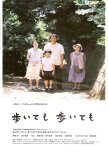
"I'm always a little too late."
'Still Walking' was conceived by Kore-eda after the deaths of his parents, and embodies his regret in being unable to fulfil his own filial piety. To keep things brief, this film is a masterpiece. Kore-eda's ability to balance heavy themes with warmth and humanity proves he is at the height of his craft. The acting from every performer couldn't be better, and the minimalistic soundtrack was always used at the right moments. It definitely warrants a second watch."The characters are utterly ordinary people: the film takes place over the course of a single summer day.... nothing of consequence happens during their rare, overnight family reunion. Yet over the course of this day, as deceptively tranquil as a calm sea, the tide flows in then out, and wavelets constantly ripple the surface." Hirokazu Kore-eda, 2008.
Was this review helpful to you?

Was this review helpful to you?























